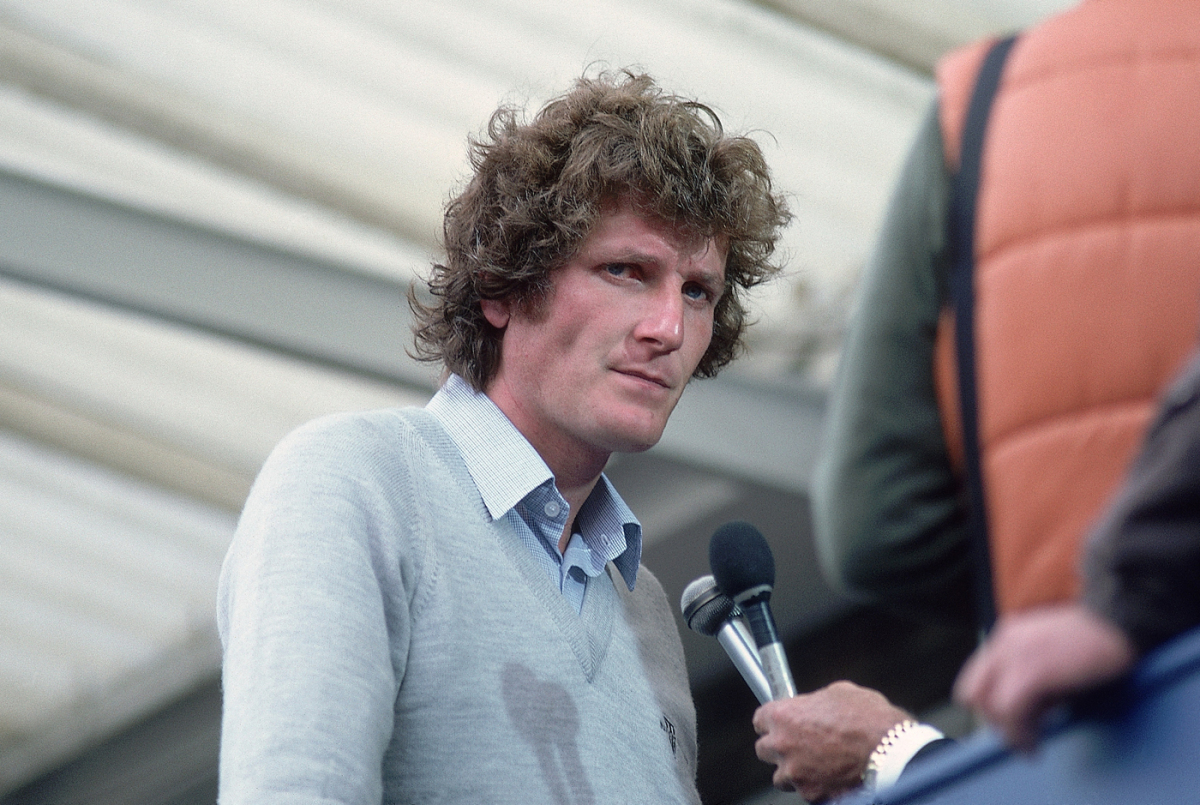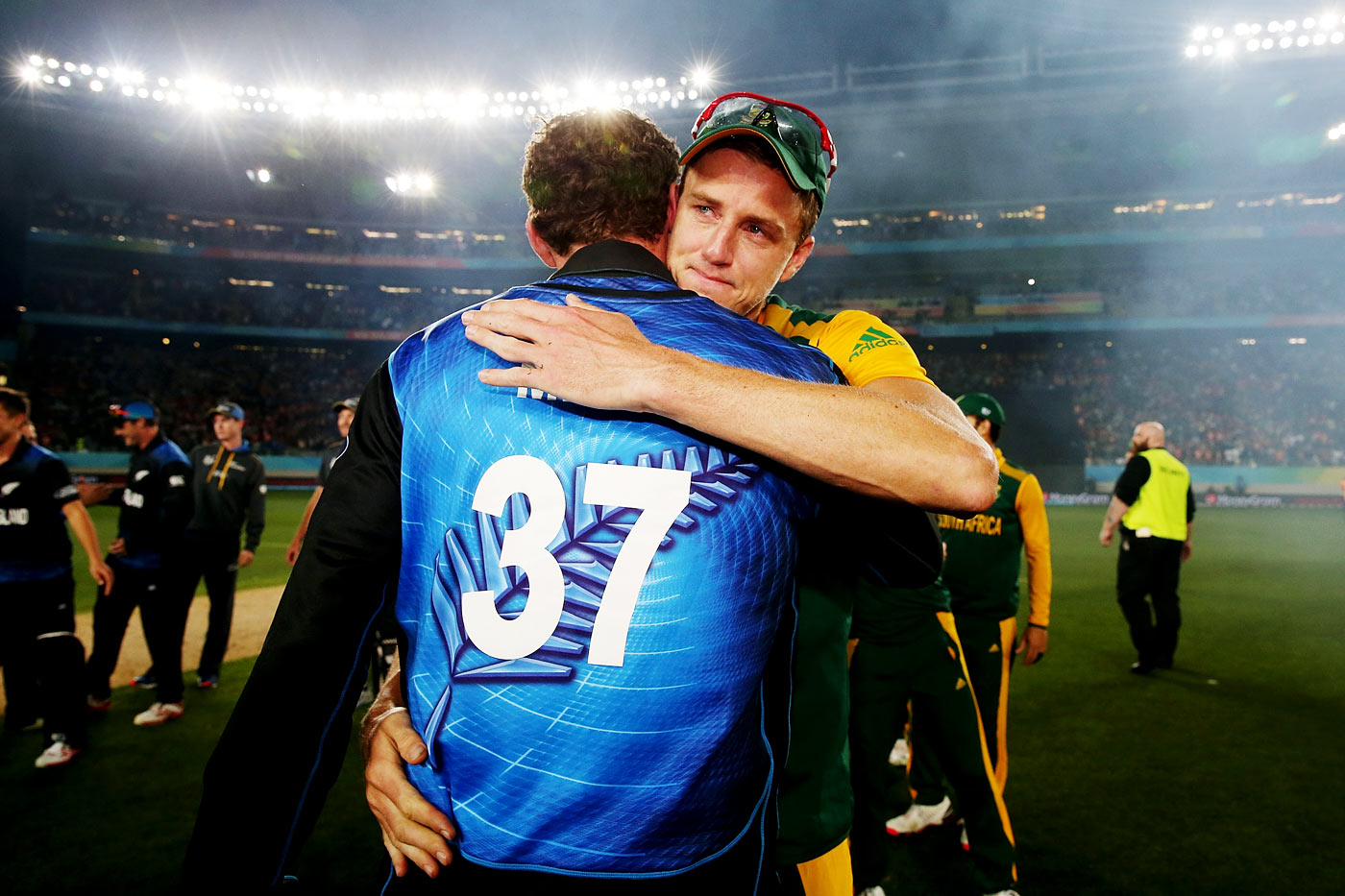
First the win, then the spleen: Bob Willis vents at the end of the Headingley Test in 1981© Getty Images
The games we follow are brutal, unforgiving and unjust, but we wouldn't have them any other way
SIMON BARNES in Cricinfo| APRIL 2015
Sporting events are put together with a number of things in mind. The idea is, (1) to make as much money as possible, (2) to provide as much entertainment as possible, (3) to provide an opportunity for the best possible sport. Very much in that order.
The best ways to do this, also in order, are: (1) make huge demands on the athletes, (2) make even bigger demands on the athletes, and (3) make near-impossible demands on the athletes. That, after all, is what they're for. It's hardly surprising, then, that at the end of every competition, most athletes seem a bit mad.
Some are light-headed with euphoria, others are speechless with relief. Some are in a post-coital haze, others are at the compulsive-talking stage. Some love the whole world, some - even the victors - hate everyone, starting with their own team-mates. Some want someone to hug, some want someone to punch.
Steve Redgrave, winning his fifth gold medal in his fifth Olympic Games, chose the occasion for a bitter jibe at the press - and we responded by applauding him in heartfelt admiration. Bob Willis celebrated one of the all-time greatest displays of fast bowling at Headingley in 1981 with a prolonged rant at that convenient target, the press, while Sebastian Coe responded to his gold medal in the 1500 metres at Los Angeles in 1984 by shouting abuse at the great massed banks of press seats in the Olympic Stadium.
Matthew Pinsent wept uncontrollably after winning his fourth gold medal at rowing; Fu Mingxia took each of her diving gold medals with an air of complete calm; Usain Bolt looked mildly gratified that the world had cottoned on to to his greatness. It's all in the way these things take you, but it's seldom straightforward.
That's because the demands we make on our athletes are extreme in every possible way. That's what sport means. The winners of the cricket World Cup were required to play nine matches in six weeks, all in the public glare, and had to win the last three of them.
The more it costs the athletes, the greater the entertainment. We want nerves to be shredded. We long for truly exceptional performances, and accept that all great victories are built on the disappointment of others. "It is not enough to succeed," said the writer Gore Vidal. "Others must fail."
In sport that statement is not funny. It's an accurate summary of the way sport works. We must put our winners through the hell of nearly losing if we are to be truly satisfied: and put the losers through the hell of thinking they were about to win, before dashing their hopes to the ground.
Thus the England cricket team went to Australia in 2013 having won the last three Ashes series and strongly fancying themselves to do so again. They were beaten 5-0 and are still suffering from the traumas they endured.
Or take the Brazil football team, seemingly inevitable winners of the 2014 World Cup. They were the story of the tournament, and yet they lost 7-1 in the semi-finals to Germany, the eventual winners. This was a humiliation: a misery that you wouldn't wish on anybody.
And yet sport works by setting up opportunities for such misery. That is what brings people in: for reasons of partisanship, in search of drama, and also in search of genuine sporting excellence. None of these things can be done satisfactorily without putting the performers to an extreme test.

And some mourn: David Luiz and Thiago Silva after Brazil's horrific loss to Germany in the 2014 World Cup © AFP
You test rather more than their physical skills. You also test the temperament, from the glossy surface down to the abyssal depths. Thus we had the extraordinary, ridiculous, hilarious and horribly cruel events of the semi-final of the World Cup of 1999.
Yes, the one when, with scores level against Australia, Lance Klusener of South Africa called for a mad single and Allan Donald at the other end forgot to run - and then dropped his bat as he tried to make up for this lapse. He was run out: South Africa were defeated in horrific circumstances. It remains a classic example of minds twisted and broken by sport.
Sport was designed as a pleasure: as a way humans could get together and test themselves in various forms of competition and mock combat. But like sex, everything in sport changes the instant people watch and when people are paid for doing it.
Sport is a triviality made serious. It was at first an opportunity in which a participant could test and savour his own courage in a comparatively safe and non-threatening way. But because of the demands of the audience - that's you and me, by the way - it has become an industry based on the breaking of human beings.
Sport is an opportunity to display bravery in public: a courage-op; and we who look on find it compelling and frequently edifying. I remember watching a super-heavyweight weightlifter set a new world record, and then Andrei Chemerkin of Russia, lifting last, had the weights increased to a level beyond even that. Then he showed the glorious strength and courage to lift it. This was at the Atlanta Olympic Games of 1996 and the entire hall was roaring in empathy with his giant effort.
It is absurd, perhaps even unfair, to ask such prodigious things of sporting performers, and yet we do it on a daily basis. We make still greater demands when it comes to the biggest tests of all. Always we are looking for ways to make life still harder for the athletes.
Anyone can catch a cricket ball. But when you're told that catching a cricket ball will earn you a million bucks, you might find it a little harder - even though you are twice as eager to catch it. Of course, some people find that extra difficulty an inspiration: and that's the sort of thing we are looking for when we set these extraordinary tests for our athletes.
It's like walking along a kerbstone. Most of us can manage to do this when the drop to the gutter is two or three inches. It would be a different matter if the drop was 3000 feet.
Reality television shows are all about trying to torment people: to make them cry on television, to make them crack up in public. Call it Masterchef Syndrome. Well, it may be cruel, but the participants choose to be there. If you don't like the heat the solution is in your hands.
But the greatest reality TV ever devised is sport. Sport brings us Garry Sobers hitting six sixes in an over; and for every such wonder, there's always a Malcolm Nash at the other end, the poor bowler who will always be remembered for that, rather than for his worthy career in cricket with nearly 1000 first-class wickets.
Hardly surprising, then, that there is always something a little odd about great performers in sport. They live in circumstances cruelly devised to test them to their limits. Those who achieve genuine greatness are never satisfied by victory, and are only ever inspired by humiliation. They must have no compunction whatsoever about inflicting humiliation on someone else.
Yes, the one when, with scores level against Australia, Lance Klusener of South Africa called for a mad single and Allan Donald at the other end forgot to run - and then dropped his bat as he tried to make up for this lapse. He was run out: South Africa were defeated in horrific circumstances. It remains a classic example of minds twisted and broken by sport.
Sport was designed as a pleasure: as a way humans could get together and test themselves in various forms of competition and mock combat. But like sex, everything in sport changes the instant people watch and when people are paid for doing it.
Sport is a triviality made serious. It was at first an opportunity in which a participant could test and savour his own courage in a comparatively safe and non-threatening way. But because of the demands of the audience - that's you and me, by the way - it has become an industry based on the breaking of human beings.
Sport is an opportunity to display bravery in public: a courage-op; and we who look on find it compelling and frequently edifying. I remember watching a super-heavyweight weightlifter set a new world record, and then Andrei Chemerkin of Russia, lifting last, had the weights increased to a level beyond even that. Then he showed the glorious strength and courage to lift it. This was at the Atlanta Olympic Games of 1996 and the entire hall was roaring in empathy with his giant effort.
It is absurd, perhaps even unfair, to ask such prodigious things of sporting performers, and yet we do it on a daily basis. We make still greater demands when it comes to the biggest tests of all. Always we are looking for ways to make life still harder for the athletes.
Anyone can catch a cricket ball. But when you're told that catching a cricket ball will earn you a million bucks, you might find it a little harder - even though you are twice as eager to catch it. Of course, some people find that extra difficulty an inspiration: and that's the sort of thing we are looking for when we set these extraordinary tests for our athletes.
It's like walking along a kerbstone. Most of us can manage to do this when the drop to the gutter is two or three inches. It would be a different matter if the drop was 3000 feet.
Reality television shows are all about trying to torment people: to make them cry on television, to make them crack up in public. Call it Masterchef Syndrome. Well, it may be cruel, but the participants choose to be there. If you don't like the heat the solution is in your hands.
But the greatest reality TV ever devised is sport. Sport brings us Garry Sobers hitting six sixes in an over; and for every such wonder, there's always a Malcolm Nash at the other end, the poor bowler who will always be remembered for that, rather than for his worthy career in cricket with nearly 1000 first-class wickets.
Hardly surprising, then, that there is always something a little odd about great performers in sport. They live in circumstances cruelly devised to test them to their limits. Those who achieve genuine greatness are never satisfied by victory, and are only ever inspired by humiliation. They must have no compunction whatsoever about inflicting humiliation on someone else.

In sport we search for drama and misery © AFP
Sometimes they are asked to do one extraordinary thing on one very special day: like a World Cup final, like competing at the Olympic Games. Sometimes they are asked to do the same thing again and again, day after day, for weeks, even years, on end.
The best of these are asked to produce both kinds of courage: the enduring kind and the kind that responds to the greatest of tests. Yet we are surprised, and sometimes contemptuous, when these people fail, or show themselves wanting in certain areas.
Thus the England cricket team fell apart. It seemed that the only thing that unified them was their hatred of Kevin Pietersen. So they got rid of him and found that they couldn't cope without him either. Sport tears people apart and it does so because it's supposed to.
Some teams find inspiration in the most difficult circumstances, as Imran Khan's cornered tigers did when Pakistan won the 1992 World Cup in Australia. Sometimes circumstances find the most unlikely of heroes: who would have tipped Roger Binny to be the hero at the World Cup in 1983?
The fact is that sport is vicious, vindictive and unfair. And if it wasn't, it wouldn't be any fun. Thus at the end of any great event there are always casualties, and often enough, the casualty is celebrating victory. Often the greatest success is the undoing of the person who achieves it.
Sport feeds on its victims: gourmandises on them. There's a passage in Anthony Powell's A Dance to the Music of Time, in which the narrator has to consider publishing a vicious review of a new book. "So far as I was concerned the juggernaut of critical opinion must be allowed to take its irrefragable course. If too fervent worshippers… were crushed to death beneath the pitiless wheels of its car, nothing could be done. Only their own adoration of the idol made them so vulnerable."
Sport is about exactly the same process.
The best of these are asked to produce both kinds of courage: the enduring kind and the kind that responds to the greatest of tests. Yet we are surprised, and sometimes contemptuous, when these people fail, or show themselves wanting in certain areas.
Thus the England cricket team fell apart. It seemed that the only thing that unified them was their hatred of Kevin Pietersen. So they got rid of him and found that they couldn't cope without him either. Sport tears people apart and it does so because it's supposed to.
Some teams find inspiration in the most difficult circumstances, as Imran Khan's cornered tigers did when Pakistan won the 1992 World Cup in Australia. Sometimes circumstances find the most unlikely of heroes: who would have tipped Roger Binny to be the hero at the World Cup in 1983?
The fact is that sport is vicious, vindictive and unfair. And if it wasn't, it wouldn't be any fun. Thus at the end of any great event there are always casualties, and often enough, the casualty is celebrating victory. Often the greatest success is the undoing of the person who achieves it.
Sport feeds on its victims: gourmandises on them. There's a passage in Anthony Powell's A Dance to the Music of Time, in which the narrator has to consider publishing a vicious review of a new book. "So far as I was concerned the juggernaut of critical opinion must be allowed to take its irrefragable course. If too fervent worshippers… were crushed to death beneath the pitiless wheels of its car, nothing could be done. Only their own adoration of the idol made them so vulnerable."
Sport is about exactly the same process.
No comments:
Post a Comment